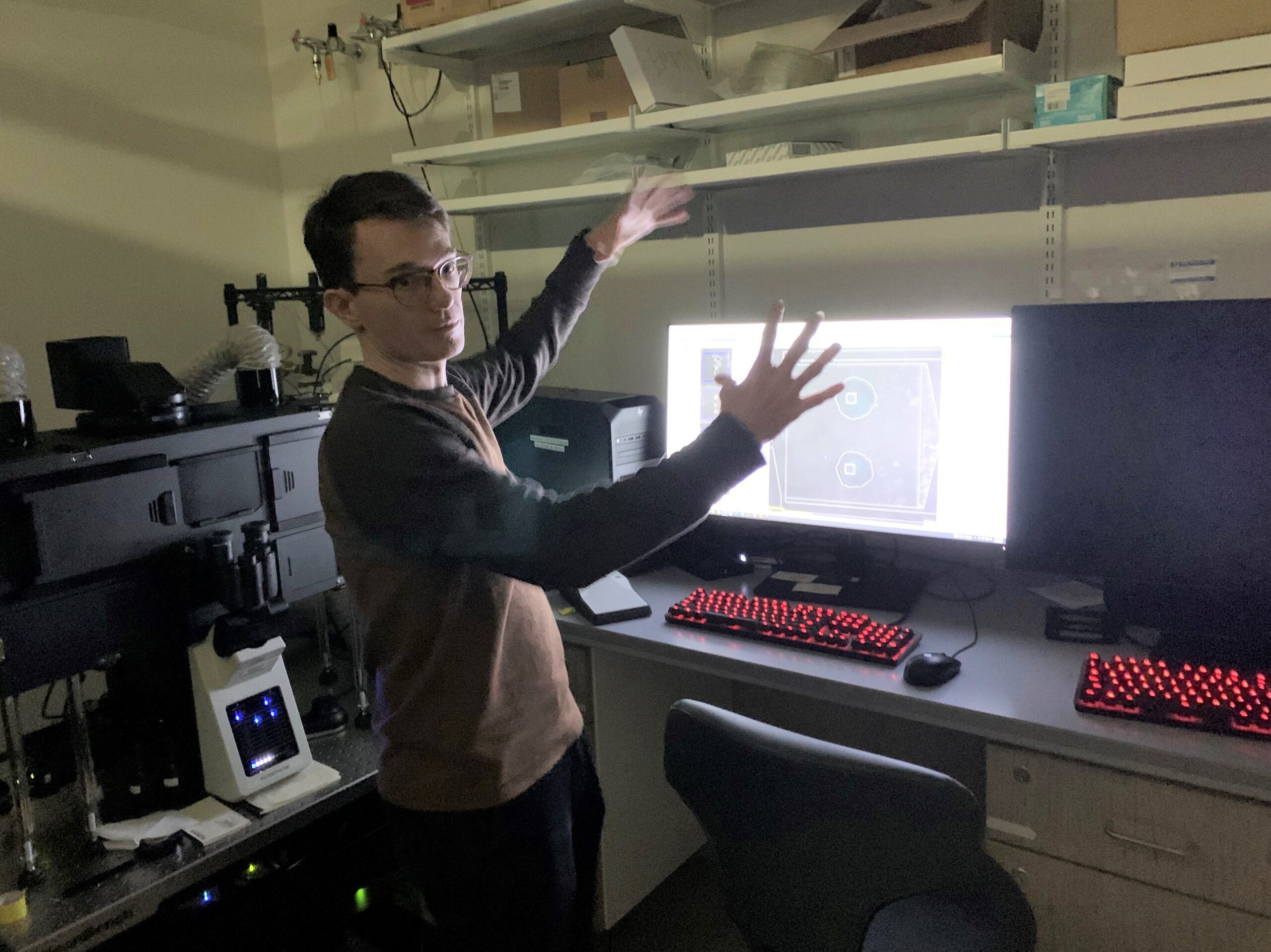Scientist Profile – Professor Joseph Larkin
Joseph Larkin, PhD
Assistant Professor of Biology and Physics
Using microbial populations as a model, the Larkin Lab seeks to understand how new self-perpetuation strategies arise throughout the course of evolution, studying how the physical and chemical environment influences microbes and how microbes, in turn, engineer that environment.
The Brainbow Bulletin spoke with Professor Joseph Larkin about his lab’s research and his personal journey as a scientist, then concluded the conversation with a segue into music, books, and his “favorite” pet peeve.

Can you briefly describe for me your research and the goals of your lab?
At the highest level, I’m interested in the key principles or differences that separate living matter from nonliving matter. More specifically, my lab is interested in how bacteria take advantage of physical laws to propagate themselves.
How do you investigate this living-versus-nonliving question as it pertains to bacteria?
Intuitively, one would think it’s an evolutionary advantage for a living thing to focus on making more of itself, but a lot of living things also invest heavily in making nonliving structures. For example, colonies of bacteria dedicate huge amounts of resources to making these large, nonliving structures called “extracellular matrix polymers” when they could be dedicating those resources to making more cells. We are interested in what conditions cause them to do that, and then why they might do that. For example, these polymers may allow a colony to absorb nutrients more efficiently, or expand into new territories, or protect against threats. My lab also studies how and why certain bacteria form spores. In this dormant state, a bacterium is no longer a living cell that grows and eats things but rather a particle that can survive extreme conditions and revert to a living cell in the future when conditions for reproduction are more favorable.
Have you identified any practical implications yet of your lab’s research?
Honestly, I don’t make strong claims about how we are going to impact humanity. I believe we are contributing to a culture of research that’s generating new ideas, new techniques, and more people who think through these problems critically and can build more knowledge from there. Having said that, microbes are everywhere, driving a lot of ecological cycles, as when plants die and are degraded and cycled into new sources of carbon for the environment. This makes bacteria critical to agriculture, for instance, and this is an underfunded area of research in my opinion. The reason there are so many people in the world today is due largely to our ability to grow huge amounts of food. In order to sustain this large population, we should focus more resources on understanding how microbes drive soil ecology, which could generate paths toward producing a greater quality and quantity of food. I don’t necessarily think my lab is going to invent a thing that suddenly makes soils more efficient, but we are part of the culture driving the investigation of these very important questions.
How did your interest in this area of research develop?
As an undergrad, I started out as a physicist, but over time I became more interested in biology, I think partly due to my mother’s influence. She was a high school biology teacher and a lab manager at Mass General. In grad school, I studied molecular biophysics, trying to understand physical properties of things like DNA or enzymes. That was very fun, but as grad school went on, I became more and more interested in things that are actually alive. I saw a couple of key talks, including one on bacteria from Joel Kralj, who graduated from the BU physics department, and I realized, “This bacterium, it really is just a kind of bag of molecules, yet somehow it is able to reproduce more of itself if you give it food, which nonliving things cannot do.” I wanted to understand that.
What’s a fact about people that surprises you?
I am not an honest-to-God metalhead—I say that out of respect to real metalheads—but I’d say by the standards of the average person, I am very into heavy metal, and that surprises people. I’m especially into classic metal, like Black Sabbath, then some death metal stuff from the ’80s—early Scandinavian death metal bands like Entombed.
Favorite book?
Maybe Decline and Fall of the Roman Empire by Edward Gibbon. It’s not dry history—it’s actually very witty writing.
Favorite pet peeve?
I think it’s when you go to a cafe or a restaurant and the table wobbles.
You’re my spirit animal… that’s my favorite peeve too!
When I was younger, I even had a fantasy of creating a startup that was going to somehow make tables that never wobbled.
*This interview was conducted and edited by Jim Cooney.